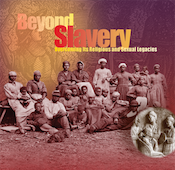Beyond Slavery
Explore the Conference
Explore the Conference by Subject
Slavery in Christian, Jewish, and Muslim Scripture and Religious Law
Christianity, Religion of the Slaveholders and the Enslaved
Sexual Assault and Exploitation Under U.S. Slavery and Jim Crow
How Slavery Has Shaped Our Understandings of Marriage and Friendship
Slavery, Violence, and the State
Emilie Townes

Emilie M. Townes is an ordained American Baptist clergywoman. She holds a Doctor of Ministry degree from the University of Chicago Divinity School and a Ph.D. in Religion in Society and Personality from Northwestern University. Townes is the Andrew W. Mellon Professor of African American Religion and Theology at Yale Divinity School. She is editor of two collections of essays, A Troubling in My Soul: Womanist Perspectives on Evil and Suffering and Embracing the Spirit: Womanist Perspectives on Hope, Salvation, and Transformation. She has also authored Womanist Ethics, Womanist Hope; In a Blaze of Glory: Womanist Spirituality as Social Witness; and Breaking the Fine Rain of Death: African American Health Issues and a Womanist Ethic of Care. She is currently focusing on two areas of research: the interrelationship between culture and evil, and women and health in the African diaspora, with attention to Brazil and the United States.
Summary: From Mammy to Welfare Queen: Images of Black Women in Public Policy Formation
The persistence of a white supremacist ideology in the United States depends on the creation and maintenance of a non-human status for Black and other darker skinned peoples. One way to trace the ongoing impact of this ideology is to see how its racial and sexual stereotypes continue to affect our public policy decisions. The negativity of the imagined images of the Mammy, the Black Matriarch, and the Welfare Queen allows us to assume the worst about Black women (and all Black folk). We go on to develop welfare policies based on both these imaginary characters’ personal failings and a Protestant-derived work ethic that considers the rich to be wealthy because they are blessed, while the poor alone are responsible for their plight. This mindset allows us to ignore the fundamental structural inequities of our society—inequities that affect every one of us. But we can reclaim religious values, including justice and love, and decide how we can build an ethical society that values the individual and respects our responsibility to each other as well as to ourselves.
